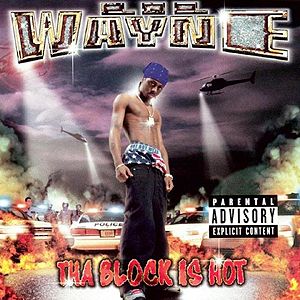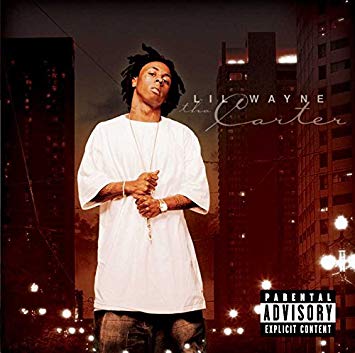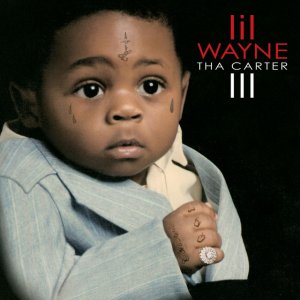
2018 marks the 10 year anniversary of Wayne's Grammy-award winning album, Tha Carter III. I remember that era like it was yesterday. Buku C3 songs leaked on the Internet, resulting in the release of the The Leak, a five-track EP featuring some of Wayne's best songs. Then came the hit single. THAT hit single that solidified the name "Lil Wayne" in mainstream music.
Too Hollygrove to Go Hollywood
There was a new video premiere on 106&Park and TRL. Wayne was in a leather jacket, on top of a limo, playing a guitar with a sucker in his mouth. The song was more pop than the Wayne I was used to, but halfway through the video, I felt a sense of satisfaction. He did it. Lollipop was the crossover track. It was his biggest solo assertion into the mainstream after dominating the underground for so many years. It ultimately became the most successful single in his career. Then came the video for Carter III's second single, A Milli. I remember standing in front of the television screen losing my mind because, "THIS MAN REALLY JUST SHOT A MUSIC VIDEO, ON SET OF ANOTHER MUSIC VIDEO." Tha Carter III was the commercial proof to what early Wayne fans knew all along. He already held his own on the Sqad and Hot Boys verses. He already proved himself on the Droughts, Dedications, 500 Degreez, 10,000 Bars, and so many others. But when he dropped C3, it gave us bragging rights.
The game changed when that album dropped. My two favorite songs were the ones that I felt were underrated: Dr. Carter and Tie My Hands. At a time when it was believed that hip-hop was dead, Wayne took it upon himself as Dr. Carter to revive it. "Welcome back hip-hop, I saved your life." And that he did. Meanwhile, Tie My Hands was for us. Released just three years following Hurricane Katrina, it was a truth of Black New Orleans stated by one of our own:
"Born right here in the U.S.A. / but due to tragedy, looked
on by the whole world as a refugee / so, accept my emotion, do not take it as an offensive gesture / it's just the epitome of my soul / and I must be me / we got spirit y'all, we got spirit / we got soul y'all, we got soul / they don't want us to see, but we already know."
Mixtape Legend
"Mixtape Weezy" changed the entire trajectory of hip-hop. First it was the Sqad Up mixtapes (I listen to SQ4 everyday) with lil, Lil Wayne in true New Orleans form. Then came Da Droughts, The Prefix, The Suffix, The Dedications; and of course No Ceilings and Sorry 4 the Wait. Every time he and DJ Drama linked up, it was a problem. You can't even talk about mixtapes without first talking about Lil Wayne. He would rap over other artist's beats and make them his own, so much so that you either forgot about or wasn't even aware of the original. No Ceilings is the most notable tape of his career, eating beats back to back with songs that we can recite perfectly to this day. As the Internet grew, so did Wayne's exposure. With project after project, he flooded every part of the Internet: iTunes, Datpiff.com, Youtube, Limewire, HotNewHipHop.com, Myspace, the list goes on and on. Wayne was everywhere and nobody could deny him.
*Lighter Flick*
Not only did Wayne change the mixtape game, he completely dominated the concept of features. You already knew what it was when you heard the lighter flick at the beginning of the song. Several up and coming artists gained widespread recognition solely because they had Wayne featured on their project; from DJ Khaled, 2Chainz (then Tity Boi of Playaz Circle), to Future.
2007-2010 was the Wayne era. He was dropping albums and tapes back to back, was featured on everybody's song, and crossing every genre. After pleading guilty to a gun charge in 2009, it's like Wayne went in turbo mode (he shot 10 videos in 2 days... your favorite rapper could never) every day leading up to his sentencing. He recorded so many projects in that time frame that the eight months he was locked up felt as if he never left. One of the most iconic verses of all time happened behind bars at Riker's Island. Drake's career was taking off, and he just released his debut album, Thank Me Later. Track #10 was Light Up featuring Jay-Z, and on the remix was Lil Wayne. Incarcerated Lil Wayne. Over a staticky jail call, Wayne proclaimed:
"I'm feelin' like Elvis, jailhouse rock / I'm not Tupac, I'm the new Pac / behind bars, but the bars don't stop / recordin' over the phone, I hope the call don't drop / Drizzy got the ball, I know the ball won't drop / and I pray that none of my kids ever wanna be cops / Young Money get 'em, Young Money got 'em / The boss got his feet up, vacation on the island"From the Carter trilogy to the influx of mixtapes; there was enough examples to prove that Wayne was the greatest. But when I heard that Light Up verse, I couldn't fathom how anybody could think otherwise.
Wayne made his rock debut with the album Rebirth in 2010, which was met with mixed criticisms. Some that knew and grew up on 17th ward, Hollygrove, throwback Wayne, weren't feeling it. As for the mainstream and new, multicultural fans; the album debuted at #2 on Billboard. This is when you first began to hear "old Wayne, new Wayne" float around, with many core fans reluctant to the "new Wayne" sound, some even trying to say that he "lost it."
Never.
Even with a difference in sound, I personally enjoyed Rebirth. Many artists take different approaches throughout their careers, but for whatever reason, saying "Wayne lost it" became a popular narrative, although the features, tapes, and songs proved otherwise. A new wave of artists started to hit the music scene, and it became convenient for some to toss Wayne to the side. The issue with that narrative is: there would be no new wave of rap artists without Lil Wayne.
New Orleans, Lil Weezyana

In 2018, I attended Wayne's fourth annual Lil Weezyana Fest in Champion's Square. This is the third Lil Weezyana Fest that I've attended. Lil Weezyana Fest 2015 will go down as one of the greatest experiences of my life. Not only was it established in honor of the 10th anniversary of Hurricane Katrina, it was an ode to New Orleans' music and culture. I was only a child during Cash Money's reign, so I didn't get to attend any of the concerts or see them shut down the bridge for music videos. However, witnessing BOTH a Hot Boys and Sqad Up reunion up-close and personal made up for it and took me to a place of New Orleans nostalgia.
Lil Weezyana Fest '16 lived up to my expectations as always, and this year's Lil Weezyana Fest did the same. The special guests are always a bonus, but being able to see Wayne in his hometown is an experience that I refuse to miss. This year, Wayne put emphasis on "This is not a show. This is a moment." The biggest moment was Birdman's unexpected appearance, apologizing to Wayne on-stage following their public beef and lawsuits behind contract violations and Tha Carter V.
"The Grammy-Award Winning, Lil Wayne"
2009. Grammy Awards. Best Rap Album. Jay-Z, T.I., Lil Wayne, Lupe Fiasco, Nas. "And the Grammy goes to... Tha Carter III, Lil Wayne." I'll never forget how Wayne hopped up those steps to accept that award. As a ride or die fan from New Orleans; it felt like he just brought home the Superbowl trophy. Our city was on the map in a way that it hadn't been in decades. New Orleans produces the greatest everything and we can't help it, it's in the DNA of our city. It's time we give our greats their flowers while they can still smell them. So with the same respect that we speak on other rap legends, Wayne is long overdue that reverence. His impact is forever embedded in music history.
"I aint going nowhere special, I won't never leave.
S**t I'm already a legend if I EVER leave."
Lil Wayne, Tha MobbTo the world, Wayne is the embodiment of pure talent and work ethic. His style is symbolic; from the dreads, grill, tattoos, to the styrofoam cup. He gave us decades of freestyles, metaphors, vocabulary, rhyme scheme, and two of the biggest artists of this era: Drake and Nicki Minaj. He inspired so many artists to pursue rap in the first place. He gave us so much music throughout his career, we have enough content to last us a lifetime. He dominated an entire era of the industry and Internet, laying the foundation for every generation of rappers to come.
To me, it's much deeper than rap. Music is a powerful tool, and the first time I realized this was in listening to Wayne. Tha Carter II was a defining album for me from beginning to end. Ain't no skips. He could be rapping about a scenario I never experienced, using words I never heard, forming metaphors I hadn't yet caught on to; and STILL made it resonate with me. I excelled in vocabulary in elementary school, partially because I already memorized a lot of the definitions when Wayne used them in a verse. Most importantly, he's a New Orleans legend. So the same way we do when it comes to the Saints -- I'ma always roll with the home team.
To Black New Orleans, Wayne is a symbol of hope. Whether you feel like he "does enough" for the city or not, he's the hometown hero that gave us living proof that we can transcend trauma, still achieve success, while keeping it so New Orleans in the process. While I'm sure that Black boys across the nation wanted to dress up as their favorite superhero for Halloween, there's an entire generation of Black boys in New Orleans that wanted to be the Hot Boys instead. Our house parties and clubs always consist of a "Wayne segment," where you get Wayne songs back to back, from Sky Is the Limit to Rollin'. Georgia Bush was the raw and uncut expression of what all of us Katrina babies were thinking. Wayne was the soundtrack to so many of our lives, from childhood, through Katrina, and even now in our city's revitalization.
To 13 years since the devastation of Hurricane Katrina.
To 10 years of Tha Carter III.
To a lifetime legacy of Lil Wayne.
Dwayne Michael Carter. Iceberg Shorty. Wayne. Tunechi. Tune. Weezy F. Baby.
Whatever you call him, just please say the "Baby," and don't forget
Best Rapper Alive.
Signed,
A loyal "Wayne-head"














